

What is ethics? We have the answer - The Ethics Centre. Questions to guide you.
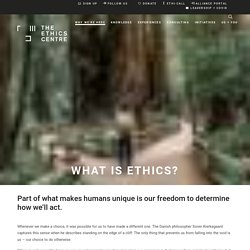
There is no ready-made way to deal with ethical challenges. They require us to respond to specific circumstances and relationships as well as the various ethical considerations – purpose, values and principles – at play. Still, there are a few questions you can ask that can help crystalise the ethical issues for you. Ethics - Introduction to ethics: Ethics: a general introduction. Ethics - Sporting Ethics: Body Modification.
University of Mary adds bioethics program to roster. Bismarck, N.D., Aug 1, 2014 / 02:22 pm (CNA).- The University of Mary in Bismarck, N.D., has teamed up with the National Catholic Bioethics Center to offer its students a master’s of science degree option in bioethics.
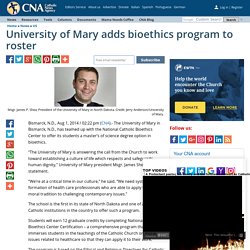
“The University of Mary is answering the call from the Church to work toward establishing a culture of life which respects and safeguards human dignity,” University of Mary president Msgr. James Shea said in a statement. “We’re at a critical time in our culture,” he said. “We need systematic formation of health care professionals who are able to apply the Catholic moral tradition to challenging contemporary issues.” Eager to Opine on the Toughest Calls in Medical Ethics - The New York Times. Ethics - Sporting Ethics: Types. Should Patients Be Able to Find Organ Donors on Facebook? - The Atlantic. The list for a donor organ in Belgium is 1,248 patients long.

Many will wait more than three years to receive a kidney. Roel Marien, 39 and the father of two young girls, says he does not have the time to sit and wait. So he took matters into his own hands and began to search for a donor among his Facebook friends. His move sparked a discussion among doctors and patients in Europe about the current system, which is based on strict laws and anonymity. Environmental Ethics.
Natural Law and Sexual Ethics. By Janet Smith Description This article reviews some of the basic principles of natural law and applies them to concrete moral issues following the thought of Thomas Aquinas and Aristotle as well as St.
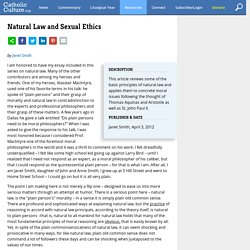
John Paul II. Publisher & Date Janet Smith, April 3, 2012 I am honored to have my essay included in this series on natural law. Business Ethics in China - Business Ethics Resources - Business Ethics - Focus Areas - Markkula Center for Applied Ethics - Santa Clara University. Medical Ethics and Human Rights: Respect for Culture - Right Now. This article is part of our July 2014 issue, Human Rights and Health By Bebe Loff I was given the rather wide brief of writing a short article on health and human rights.
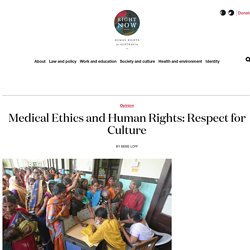
Since this has been the entire focus of my work for the last 20 years, deciding upon an issue to write about has been no mean feat. What I have settled on is a discussion of the application of internationally accepted principles of medical ethics as they apply in contexts that differ in terms of culture, religion, governance and access to resources. Perhaps, somewhat oddly for a rights person, I will argue that patient rights are relative and are not well captured by a reductive focus on autonomy or patient self determination demanded by these accepted standards. In 2000 the United Nations Committee on Economic, Social and Cultural Rights produced a document entitled “General Comment 14, The right to the highest attainable standard of health.” What are Environmental Ethics? Environmental ethics is a branch of ethics that studies the relation of human beings and the environment and how ethics play a role in this.
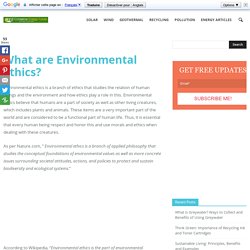
Environmental ethics believe that humans are a part of society as well as other living creatures, which includes plants and animals. These items are a very important part of the world and are considered to be a functional part of human life. Thus, it is essential that every human being respect and honor this and use morals and ethics when dealing with these creatures. As per Nature.com, ” Environmental ethics is a branch of applied philosophy that studies the conceptual foundations of environmental values as well as more concrete issues surrounding societal attitudes, actions, and policies to protect and sustain biodiversity and ecological systems.”
Global warming, global climate change, deforestation, pollution, resource degradation, threat of extinction are few of the issues from which our planet is suffering. Bioethics International. Home - Nuffield Bioethics. Bioethics 101. Bioethics 101 provides a systematic, five-lesson introductory course to support educators in incorporating bioethics into the classroom through the use of sequential, day-to-day lesson plans.
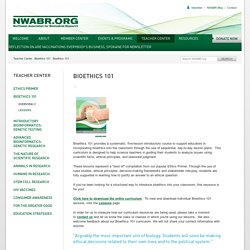
This curriculum is designed to help science teachers in guiding their students to analyze issues using scientific facts, ethical principles, and reasoned judgment. Where the World Finds Bioethics. Teaching controversial and social issues in science / biology: BEEP BioEthics Education Project. E-Commerce Business Ethics Case Studies. BBC Religion & Ethics. Faith-Based Activism on Climate Change. KIM LAWTON, correspondent: Deep in the bayous of south Louisiana, residents have little doubt about the impact of climate change.
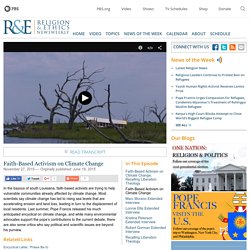
THERESA DARDAR: We live here, so we see it happening. We see the land sinking, sea level rise, we see it all. LAWTON: Theresa Dardar is part of a small Native American fishing community whose families have been here for generations. Top Ten Takeaways from 'Laudato Si'' Pope Francis’ revolutionary new encyclical calls for a “broad cultural revolution” to confront the environmental crisis.

Michael Sandel: Ethics In Genetic Engineering - Law and Ethics - Browse - Big Ideas - ABC TV. Francis puts environment above short-term politics. Sometime in April 1226, lying acutely ill in the grounds of St Clare’s San Damiano convent, St Francis of Assisi wrote the Cantico di fratre sole, the Canticle of Brother Sun.
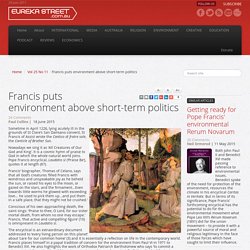
Nowadays we sing it as ‘All Creatures of Our God and King’. It is a cosmic hymn of praise to God in which the whole natural world joins. Pope Francis encyclical, Laudatio si (‘Praise Be’), quotes it at length (87). Francis’ biographer, Thomas of Celano, says that all God’s creatures ‘filled Francis with wondrous and unspeakable joy as he beheld the sun, or raised his eyes to the moon, or gazed on the stars, and the firmament...Even towards little worms he glowed with exceeding love... he used to pick them up...and put them in a safe place, that they might not be crushed.’ Conscious of his own approaching death, the saint sings: ‘Praise to thee, O Lord, for our sister mortal death, from whom no one may escape.’ Laudatio si gives no comfort to global warming deniers. ABC Religion & Ethics. Peter Singer on Bioethics. The religion of environmentalism. As I have often noted, the most dynamic and influential religion of the past hundred years has not been Christianity, let alone Judaism, the two religions that created the Western world.
Nor has it been Islam. It has been Leftism. Leftism has influenced the literary, academic, media and, therefore, the political elite far more than any other religion. It has taken over Western schools from elementary through graduate. Machine ethics: The robot’s dilemma. Peter Adams The fully programmable Nao robot has been used to experiment with machine ethics. In his 1942 short story 'Runaround', science-fiction writer Isaac Asimov introduced the Three Laws of Robotics — engineering safeguards and built-in ethical principles that he would go on to use in dozens of stories and novels. They were: 1) A robot may not injure a human being or, through inaction, allow a human being to come to harm; 2) A robot must obey the orders given it by human beings, except where such orders would conflict with the First Law; and 3) A robot must protect its own existence as long as such protection does not conflict with the First or Second Laws.
4. Fundamental ethical codes (Judaism, Christianity, Islam, Buddhism) – similarities and disparities « Between Religions and Ethics – A Common Ground. Similarities Between Religious Rules and Ethical Rules by Popa Artur , XI E, National College Octav Onicescu. Gene politics. The revelation in April that scientists had edited the genome of a human embryo — an inevitable development to anyone paying attention to biotechnological advances — has sparked the biggest bioethical debate of the year and one that will last for decades.
The overwhelming consensus is that such embryos should not be brought to term in clinical settings — at least not for now. The debate over when, if ever, that should take place has played out in the scientific literature in duelling articles, arguments about the technology’s efficacy and calls for an Asilomar-like conference on bioethics. So it is little surprise that lawmakers are weighing in. The climate was more educational than controversial, with lawmakers asking the usual questions about the risks, benefits and ethics of engineering future generations of the human race. If the budget passes, this clause would be the first time that lawmakers have used the FDA to limit human embryo research.
All About Environmental Sociology. Overview Environmental sociology is a subfield of the wider discipline in which researchers and theorists focus on the relationships between society and the environment. Environmental ethics - Wikipedia. US agencies plan research-ethics overhaul. National Institutes of Health US President Barack Obama's administration is considering significant changes to rules that govern biomedical research. Scientists discuss the key issues for Laudato Si' International Seminar on Science and Religions/Rome Reports Scientists and religious leaders from 15 countries and eight denominations met at the Shrine of Torreciudad in Spain where they launched an ambitious Declaration on the Environment, notes Rome Reports.
Great apes: Fresh strategies to save orangutans : Nature : Nature Research. LAUDATO SI' Top 10 Things You Need to Know about Pope Francis' Laudato Si' The Ethics of Genetics. Ethics.